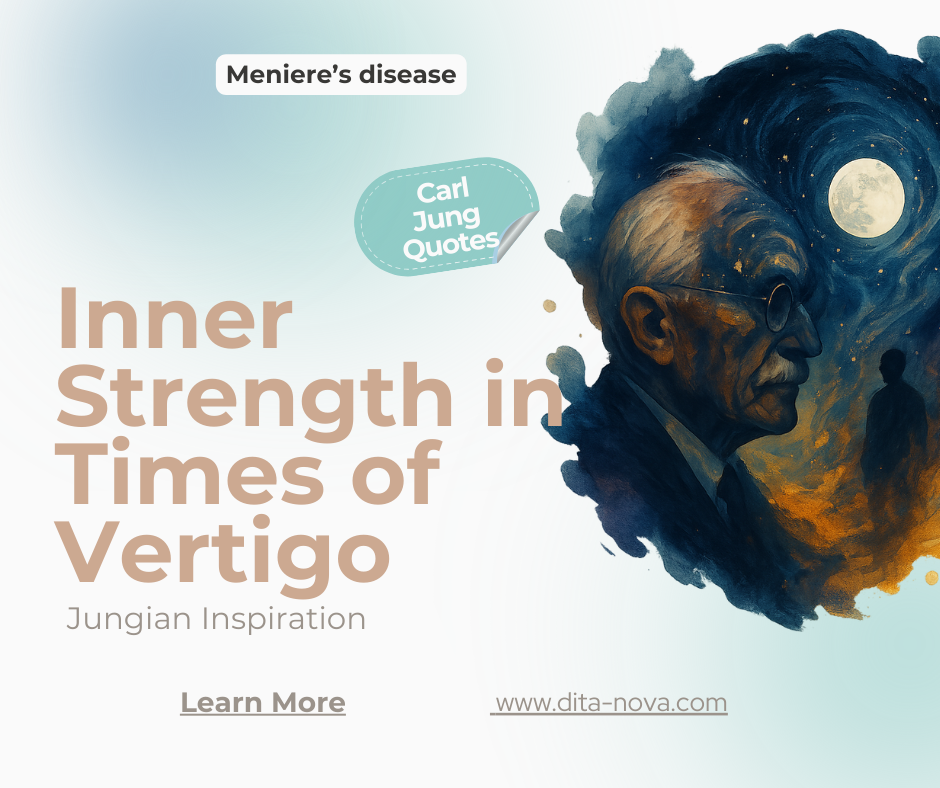Meniere’s Meets Jungian Wisdom
If you live with Meniere’s disease, you already know the unpredictable nature of vertigo, tinnitus, and hearing loss. One moment you’re fine; the next, the room is spinning, and your balance feels stolen. It’s not just a physical condition — it’s an emotional and mental challenge that can shake your confidence and your sense of self.
Swiss psychiatrist Carl Jung — known for his deep explorations into the human psyche — left us with profound wisdom that can guide us through life’s hardest storms. His carl jung quotes and ideas about meaning-making, resilience, and self-discovery can be powerful companions for those navigating chronic illness.
This guide blends Jungian psychology with practical coping strategies so that you can approach Meniere’s not just as a medical condition, but as a journey toward inner strength and self-understanding.
Facing the Shadow of Chronic Illness
Jung described “the shadow” as the hidden, often unwanted parts of ourselves — fear, anger, vulnerability. When Meniere’s hits, your shadow might take the form of frustration at your body, fear of future episodes, or even resentment toward activities you can no longer enjoy.
“One does not become enlightened by imagining figures of light, but by making the darkness conscious.” — Carl Jung
Instead of suppressing these emotions, Jung would encourage you to acknowledge them. Name your frustration. Allow yourself to grieve the changes. By facing your shadow, you loosen its grip and create space for self-compassion.
Practical Exercise: Write a “shadow letter” to your illness. Let your anger, sadness, and fear spill onto the page without judgment. Then, close the notebook and take a breath — you’ve honoured your inner truth.
Finding Meaning in the Struggle
One of Jung’s central beliefs was that humans need meaning as much as they need air and water. Chronic illness can make life feel purposeless, but reframing your experience can help you discover new sources of significance.
“The least of things with a meaning is worth more in life than the greatest of things without it.” — Carl Jung
Maybe your Meniere’s journey teaches you patience, or inspires you to advocate for others. Maybe it deepens your appreciation for stillness. Every challenge can be a teacher if you’re willing to listen.
Tip: Keep a “meaning journal” where you jot down small ways your illness has led to unexpected growth. Over time, you may see your struggle in a new light — not as a thief of joy, but as a sculptor of resilience.
Archetypes for Meniere’s Warriors
Jung believed that archetypes — universal symbols and patterns in the human psyche — can help us access strength and wisdom. Three archetypes can be especially helpful for people living with Meniere’s:
- The Warrior – Draw on courage and perseverance in the face of symptoms.
- The Sage – Seek knowledge, patterns, and self-understanding.
- The Caregiver – Offer and accept support, building bonds that sustain you.
Visualization Practice: Close your eyes and picture yourself as each archetype. As the Warrior, feel grounded and steady, sword planted in the earth. As the Sage, imagine holding a lantern, lighting your path through the unknown. As the Caregiver, feel your heart expand toward others.
Dreams, the Unconscious, and Healing Insights
For Jung, dreams were messages from the unconscious — a way our deeper mind speaks to us.
“Dreams are the facts from which we must proceed.” — Carl Jung
If Meniere’s feels overwhelming, dream journaling can help you process emotions you can’t yet put into words. Record your dreams each morning, even fragments. Look for recurring images — a storm, a winding path, a safe harbor. These symbols may offer clues to your inner coping strategies.
Example: A dream of standing in still water while chaos swirls around might reflect your ability to find calm even in vertigo’s disorienting spin.
Shifting from Control to Adaptation
One of the hardest lessons of chronic illness is accepting uncertainty. Jung often spoke about the transformation that comes when we stop clinging to control and instead learn to adapt.
During a vertigo episode, trying to “fight” the sensation can increase anxiety. Instead, focus on gentle adaptation — grounding techniques, deep breathing, or guided meditation.
Resource: Explore mindfulness practices in Mindfulness in Dubai Marina for techniques you can adapt at home.
Building Your Support Network
Jung emphasized connection as part of individuation — our journey to becoming whole. Living with Meniere’s is easier when you don’t walk alone.
- Join a support group: The Vestibular Disorders Association offers both online and local resources.
- Practice vulnerability: Share your experience with friends or family so they understand your needs.
- Seek shared wisdom: Learn from others’ coping strategies and share your own.
If you’re exploring body-based ways to improve balance, see From Dizzy to Dazzling: Yoga for Meniere’s.
Strength in the Storm
Meniere’s disease may alter your plans, but it does not have to define your spirit. Through Jung’s insights, you can face the shadow of illness, find meaning in difficulty, and cultivate archetypal strengths that help you weather the storm.
“I am not what happened to me, I am what I choose to become.” — Carl Jung
Let Jung’s wisdom guide you to resilience, self-awareness, and the unshakable truth that even in dizziness, you can stand tall.
FAQ
What is Meniere’s disease?
Meniere’s is an inner ear disorder causing episodes of vertigo, hearing loss, tinnitus, and a feeling of fullness in the ear. Learn more at the Mayo Clinic.
How does chronic illness affect mental health?
It can lead to anxiety, depression, and isolation. Building resilience and support systems is key.
What are Carl Jung’s key ideas about resilience?
Jung emphasized individuation, shadow work, and meaning-making as ways to grow through hardship. See Carl Jung Quotes About Life for inspiration.
How can Jungian psychology help people with Meniere’s disease?
By offering frameworks for self-understanding, acceptance, and finding meaning in the illness journey.
Are there practical exercises from Jung’s work that can reduce stress during vertigo?
Yes — dream journaling, archetype visualization, and mindful breathing can all help.



